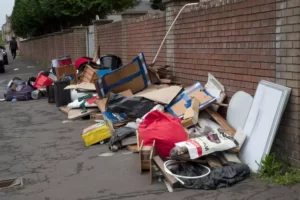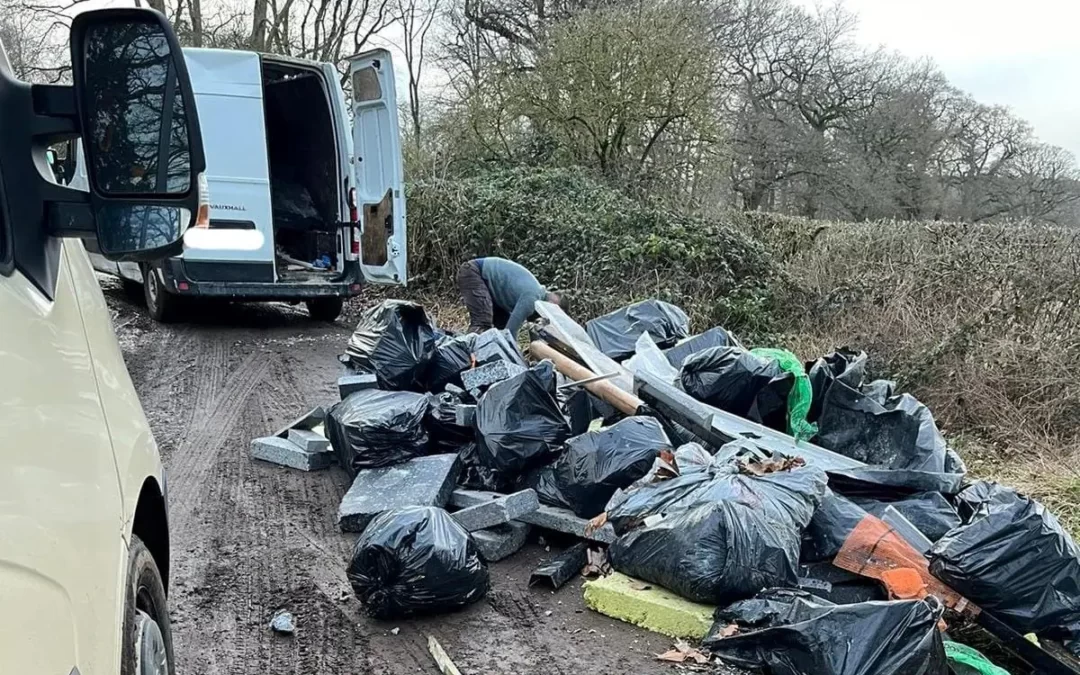Introduction
Fly tipping is the illegal dumping of waste or rubbish, usually in unauthorized areas such as roadsides, vacant lots, or countryside. It can include anything from household waste to larger items like furniture or construction debris. Fly tipping is not only harmful to the environment but also poses health and safety risks, and it’s often costly to clean up.
Fly-tipping has become a pervasive issue across the UK, with thousands of incidents reported each year.
The figures show 284,762 fly-tipping incidents were reported between 2019/20 and 2022/23.
Environmental Degradation
The environmental impact of fly-tipping is profound. Dumped waste poses significant threats to ecosystems and wildlife. Hazardous materials leach into the soil and waterways, contaminating fragile habitats and endangering native species. Moreover, non-biodegradable plastics persist for years, contributing to the scourge of marine pollution.
Public Health Risks
Fly-tipping poses serious risks to public health, particularly in densely populated urban areas. Rotting waste attracts vermin and insects, increasing the prevalence of diseases. Toxic chemicals leaching from dumped materials can contaminate groundwater, jeopardizing the safety of drinking water supplies and agricultural land.
Economic Burden
The economic toll of fly-tipping in the UK is significant. Local authorities are tasked with clearing and disposing of illegally dumped waste, diverting resources from essential services. Taxpayer money that could be allocated to healthcare, education, and infrastructure is instead spent on clean-up efforts.
Legal and Social Implications
Fly-tipping is not only an environmental and economic issue but also a legal and social one. Those caught illegally dumping waste face fines, prosecution, and potential imprisonment. However, enforcement efforts are often hampered by the covert nature of the crime and the challenges of identifying perpetrators.

Litter and fly-tipping in Pollokshields, Glasgow, in May 2023.
What can we do to help?
Instead of engaging in the destructive practice of fly-tipping, there are several responsible alternatives for disposing of waste.
Use Authorised Waste Collection Services
Most communities offer regular waste collection services for household rubbish and recycling. Use these services to ensure that your waste is disposed of safely and legally.
Visit Recycling Centers
Many areas have recycling centers where you can drop off items such as paper, glass, plastic, and metal for recycling. Separate your recyclables and take them to these centers to ensure they are properly processed.
Arrange Bulky Waste Collection
For large items such as furniture, appliances, or garden waste, arrange for bulky waste collection services provided by local authorities or private companies. They will collect these items from your home for proper disposal or recycling.
Composting
Organic waste such as food scraps, yard trimmings, and garden waste can be composted instead of being thrown away. Composting not only reduces waste but also produces nutrient-rich compost for gardening.
Reuse and Donate
Before discarding items, consider whether they can be reused or donated. Clothes, furniture, electronics, and household items in good condition can often find new homes through charity shops, online marketplaces, or donation centers.
Report Illegal Dumping
If you come across instances of fly-tipping, report it to the relevant authorities immediately. Providing information about the location and details of the incident can help enforcement agencies take action against offenders.
By choosing these alternatives to fly-tipping, individuals can contribute to preserving the environment, protecting public health, and maintaining the cleanliness of their communities. Together, we can work towards a cleaner, greener future for all.

